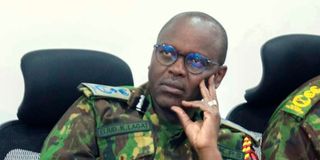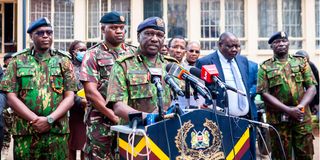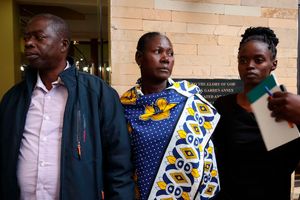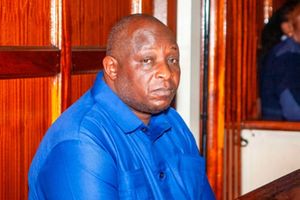
Deputy Inspector-General of Police Eliud Lagat.
As meteoric as his rise was, the abrupt setback faced by Deputy Inspector-General (DIG) of Police Eliud Kipkoech Lagat has been equally dramatic.
On Monday, Mr Lagat stepped aside from his position following uproar over the killing of teacher and blogger Albert Ojwang in police custody.
Mr Lagat was the complainant in the case that led to the arrest of Ojwang in Homa Bay.
In 2012, when two blasts rocked Nairobi’s Eastleigh estate, causing destruction, injuries and panic, Mr Lagat was stationed at the Directorate of Criminal Investigations (DCI) headquarters on Kiambu Road. According to police, the first explosion was intended to attract onlookers, while the second was meant to injure them.
A rapid response team was assembled and dispatched under Mr Lagat’s command. This would become a defining moment in his career.
At the time, he was the Deputy Head of the Bomb and Hazardous Materials Disposal Unit of the DCI. An officer who was part of that response team told the Nation that Mr Lagat carefully coordinated their movements to prevent further casualties.
“He advised us to proceed cautiously as we combed the area for any additional bombs. We managed to secure the area and ensure public safety,” said the officer, who requested anonymity due to protocol restrictions.

The Deputy Inspector General of Police Eliud Lagat.
Mr Lagat’s effective command of the operation earned him a letter of commendation from the National Police Service (NPS).
At the Bomb and Hazardous Materials Disposal Unit, his responsibilities included dealing with improvised explosive devices, post-blast investigations, VIP and critical infrastructure security and crime scene forensics. He held the position from 2007 to 2015. Prior to that, from 2005 to 2007, he served as Deputy Head of the DCI’s Crime Scene Support Unit.
Mr Lagat joined NPS in 1998 and trained for a year at the Kenya Police College in Kiganjo, after which he was deployed to the General Service Unit (GSU), where he started off as a mechanic repairing police vehicles.
Between 2001 and 2005, the University of Eastern Africa, Baraton, graduate served as a forensic investigator at DCI.
From July 2015 to April 2020, he led the Bomb and Hazardous Materials Disposal Unit before being appointed Deputy Director in the DCI reforms section, where he served until July 2021. He was later promoted to Director of Reforms at DCI.
Decorated with State honours
In April 2023, he became the Commandant of the GSU. Following a competitive interview in July 2024, Mr Lagat—then Acting DIG—was officially confirmed to the role. His counterpart, Mr Gilbert Masengeli, was confirmed as DIG of the Administrative Police Service.
As DIG in charge of the Kenya Police, Mr Lagat oversaw daily operations, coordination, supervision, training and internal oversight.

Inspector General of Police Douglas Kanja addresses journalists on June 9, 2025 at Central Police Station where Albert Ojwang is reported to have died while in police custody. He is flanked by his deputies Eliud Lagat (left) and Gilbert Masengeli (second left).
He holds a master’s degree in Armed Conflict and Peace Studies from the University of Nairobi and a Bachelor’s degree in Automotive Technology from the University of Eastern Africa, Baraton. He is also an alumnus of the National Defence College of Kenya.
Over the years, Mr Lagat has been decorated with several State honours, including the Elder of the Burning Spear (EBS), Order of the Grand Warrior (OGW), Head of State Commendation (HSC) and the Silver Star (SS) of Kenya.
Killing sparked national outrage
However, in the 27th year of his career, Mr Lagat now finds himself at the centre of controversy following the murder of Ojwang.
Ojwang’s killing has sparked national outrage. He died inside a holding cell at Nairobi’s Central Police Station, just hours after being arrested from his father’s home in Kakoth, Homa Bay County.

A man displays a placard with the picture of Deputy Inspector-General of Police Eliud Lagat during protests in Nairobi on June 12, 2025 to demand justice for Albert Ojwang who died in police custody.
According to Mr Kanja and DCI boss Amin Mohammed, Ojwang was arrested following a complaint by Mr Lagat.
The police initially claimed that Ojwang had banged his head against a wall in the cell and was pronounced dead on arrival at Mbagathi Hospital, where he had been rushed for treatment.
In a span of 24 hours, police released three different statements concerning the incident.
The first explained that Ojwang hit his head on a wall, leading to his death. The second announced the interdiction of the officers on duty that night. The third was a detailed timeline of the arrest and the events that followed.
The killing has not only raised questions about police accountability, but also cast a dark shadow over the career of a man once seen as the future head of the NPS.








